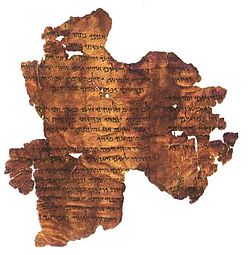Text
The original text was written in Hebrew language. This chapter is divided into 23 verses in English Bibles, but counted to 25 verses in Hebrew Bible using a different verse numbering (see below).
Verse numbering
There are some differences in verse numbering of this chapter in English Bibles and Hebrew texts: [6]
| English | Hebrew |
|---|
| 1:10-2:1 | 2:1-3 |
| 2:2-23 | 2:4-25 |
|
This article generally follows the common numbering in Christian English Bible versions, with notes to the numbering in Hebrew Bible versions.
Textual witnesses
Some early manuscripts containing the text of this chapter in Hebrew are of the Masoretic Text tradition, which includes the Codex Cairensis (895), the Petersburg Codex of the Prophets (916), Aleppo Codex (10th century), Codex Leningradensis (1008). Fragments containing parts of this chapter in Hebrew were found among the Dead Sea Scrolls, including 4Q78 (4QXIIc; 75–50 BCE) with extant verses 11–13 (verses 13–15 in Hebrew Bible); [9] [11] 4Q79 (4QXIId; 75–50 BCE) with extant verses 1–3 (verses 3–5 in Hebrew Bible); [9] [14] 4Q82 (4QXIIg; 25 BCE) with extant verses 2–3, 12–17, 20–23 (verses 1–2, 4–5, 14–19, 22–25 in Hebrew Bible); [9] [16] and 4Q166 (4QpHosa; Hosea Commentary; Pesher Hoshe'a; late first century BCE) with extant verses 8–14. [17] [18] [20]
There is also a translation into Koine Greek known as the Septuagint, made in the last few centuries BCE. Extant ancient manuscripts of the Septuagint version include Codex Vaticanus (B;  B; 4th century), Codex Alexandrinus (A;
B; 4th century), Codex Alexandrinus (A;  A; 5th century) and Codex Marchalianus (Q;
A; 5th century) and Codex Marchalianus (Q;  Q; 6th century). [a]
Q; 6th century). [a]
Indictment of Israel, the Unfaithful Wife (2:2–15)
The verses are numbered in the Masoretic Text as 2:4–17. The relationship between Yahweh and Israel is depicted as one of husband and wife. Israel has been unfaithful to her husband and gone whoring after her lovers, the idols/Baals, from whom she hopes to obtain 'grain, wine, oil, and other products', without realizing that those actually come from Yahweh (verses 5, 8). Therefore, Yahweh will strip her naked (verse 3, 9–10), block her way to find her lovers (verse 6–7), withdraw the grain, wine, etc. (v. 9), and allow her religious festivities to cease (verse 11, 13). Israel will then return to Yahweh, so Yahweh will bring her in the wilderness, responding to him there, like during the Exodus, and bring her again into Canaan (verses 14–15).
This page is based on this
Wikipedia article Text is available under the
CC BY-SA 4.0 license; additional terms may apply.
Images, videos and audio are available under their respective licenses.

